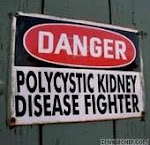Jul 29, 2010 - Agreed to Senate. This is the latest version of the bill currently available on GovTrack.
SRES 592 ATS
111th CONGRESS
2d Session
S. RES. 592
Designating the week of September 13-19, 2010, as ‘Polycystic Kidney Disease Awareness Week’, and supporting the goals and ideals of Polycystic Kidney Disease Awareness Week to raise awareness and understanding of polycystic kidney disease and the impact the disease has on patients now and for future generations until it can be cured.
IN THE SENATE OF THE UNITED STATES
July 22, 2010
Mr. KOHL (for himself, Mr. HATCH, and Mr. BENNETT) submitted the following resolution; which was referred to the Committee on the Judiciary
July 29, 2010
Committee discharged; considered and agreed to
--------------------------------------------------------------------------------
RESOLUTION
Designating the week of September 13-19, 2010, as ‘Polycystic Kidney Disease Awareness Week’, and supporting the goals and ideals of Polycystic Kidney Disease Awareness Week to raise awareness and understanding of polycystic kidney disease and the impact the disease has on patients now and for future generations until it can be cured.
Whereas polycystic kidney disease (known as ‘PKD’) is one of the most prevalent life-threatening genetic diseases in the world, affecting an estimated 600,000 people in the United States, including newborn babies, children, and adults, regardless of sex, age, race, geography, income, or ethnicity;
Whereas polycystic kidney disease comes in 2 forms, autosomal dominant, which affects 1 in 500 people worldwide, and autosomal recessive, a rare form that affects 1 in 20,000 live births and frequently leads to early death;
Whereas polycystic kidney disease causes multiple cysts to form on both kidneys, leading to an increase in kidney size and weight;
Whereas the cysts caused by polycystic kidney disease can be as small as the head of a pin or as large as a grapefruit;
Whereas polycystic kidney disease is a systemic disease that damages the kidneys and the cardiovascular, endocrine, hepatic, and gastrointestinal systems;
Whereas patients with polycystic kidney disease often experience no symptoms during the early stages of the disease, and many patients do not realize they have PKD until the disease affects other organs;
Whereas the symptoms of polycystic kidney disease can include high blood pressure, chronic pain in the back, sides or abdomen, blood in the urine, urinary tract infections, heart disease, and kidney stones;
Whereas polycystic kidney disease is the leading genetic cause of kidney failure in the United States;
Whereas more than half of patients suffering from polycystic kidney disease will reach kidney failure, requiring dialysis or a kidney transplant to survive, thus placing an extra strain on dialysis and kidney transplantation resources;
Whereas polycystic kidney disease has no treatment or cure;
Whereas polycystic kidney disease instills in patients the fear of an unknown future with a life-threatening genetic disease, and of possible genetic discrimination;
Whereas polycystic kidney disease is an example of how collaboration, technological innovation, scientific momentum, and public-private partnerships can--
(1) generate therapeutic interventions that directly benefit the people suffering from polycystic kidney disease;
(2) save billions of Federal dollars paid by Medicare, Medicaid, and other programs for dialysis, kidney transplants, immunosuppressant drugs, and related therapies; and
(3) open several thousand spots on the kidney transplant waiting list;
Whereas improvements in diagnostic technology and the expansion of scientific knowledge about polycystic kidney disease have led to--
(1) the discovery of the 3 primary genes that cause polycystic kidney disease and the 3 primary protein products of the genes; and
(2) the understanding of cell structures and signaling pathways that cause cyst growth, which has produced multiple polycystic kidney disease clinical drug trials; and
Whereas thousands of volunteers throughout the United States are dedicated to expanding essential research, fostering public awareness and understanding, educating patients and their families about polycystic kidney disease to improve treatment and care, providing appropriate moral support, and encouraging people to become organ donors: Now, therefore, be it
Resolved, That the Senate--
(1) designates the week of September 13-19, 2010, as ‘Polycystic Kidney Disease Awareness Week’;
(2) supports the goals and ideals of a national week to raise public awareness and understanding of polycystic kidney disease;
(3) recognizes the need for additional research into a treatment and a cure for polycystic kidney disease; and
(4) encourages the people of the United States and interested groups to--
(A) support Polycystic Kidney Disease Awareness Week through appropriate ceremonies and activities;
(B) promote public awareness of polycystic kidney disease; and
(C) foster understanding of the impact of the disease on patients and their families.
Subscribe to:
Post Comments (Atom)











No comments:
Post a Comment